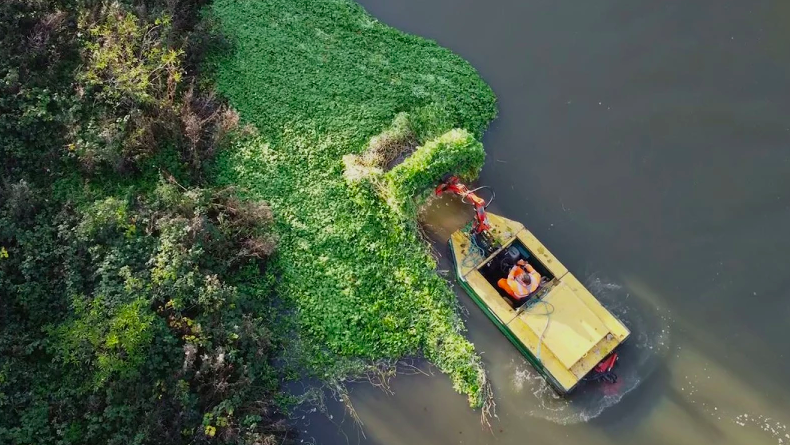Weed invasion causes stress for UK’s canals

The Canal & River Trust is predicting that warmer wetter summers bought about by climate change are making the fight to stop Britain’s canals from becoming choked by invasive weeds more challenging.
The trust’s annual summer programme to tackle the weed across its 2,000 miles of waterways is well underway – with volunteers, staff and contractors working to remove the weed before it clogs up canals and destroys native wildlife.
Over the coming months the charity says it will need to invest over £1.1m to remove more than 2,500 tonnes of invasive weed – equivalent to 14.5 blue whales.
Aquatic weeds like duckweed, floating pennywort and azolla grow extremely quickly. Azolla can double in size every three days, while some of the fastest-growing weeds can double in size within a matter of hours. Left unchecked, the weed causes problems for boats, rowers and anglers. It starves water plants of light, sucks up the oxygen fish need to breathe and, in turn, is damaging to much-loved species such as kingfishers and otters.
Warmer summers are increasing the growing months for invasive aquatic weeds, causing canals, rivers, ponds and pools to turn a vibrant shade of green and forming a mat across the surface of the water.
The proliferation of weed in summer isn’t new, but the hotter weather and fiercer storms that are becoming more common as a result of climate change are making the problem worse. Weed likes high temperatures, along with plenty of rain that washes nutrients from the surrounding area into the waterways – with the recent weather providing ideal spreading conditions.
Physically removing the weed is the quickest way to deal with the phenomenon, and Canal & River Trust teams, contractors and volunteers across England and Wales have launched a fleet of boats to scoop up the weed and take it out of the water.
Julie Sharman, chief operating officer at the trust says: “The changing climate, with hotter summers becoming more common, is making this natural phenomenon even more of a challenge. The weed isn’t harmful, but it looks unappealing and is often studded with litter that gets blown into the water from the streets. Our canals and rivers are wonderful places to visit, and are especially popular in summer, so it’s important to keep them looking their best.
“A recent decision by government to cut future funding for the nation’s canal network is going to make winning our battle against aquatic weed even harder. We run regular volunteer parties where people can get involved in all sorts of tasks to care for their local waterway, including removing weed, and we’d welcome any help in keeping our canals alive.”
The UK’s Department for Environment, Food & Rural Affairs recently confirmed it will provide an additional funding package to the Canal & River Trust (CRT) beyond March 2027, when the current grant comes to an end. But, members of Fund Britain’s Waterways, a new coalition of organisations representing hundreds of thousands of users and supporters of inland waterways, says it has significant concern about relative cuts in real terms as the package marks a further dramatic cut compared with funding in the past.











